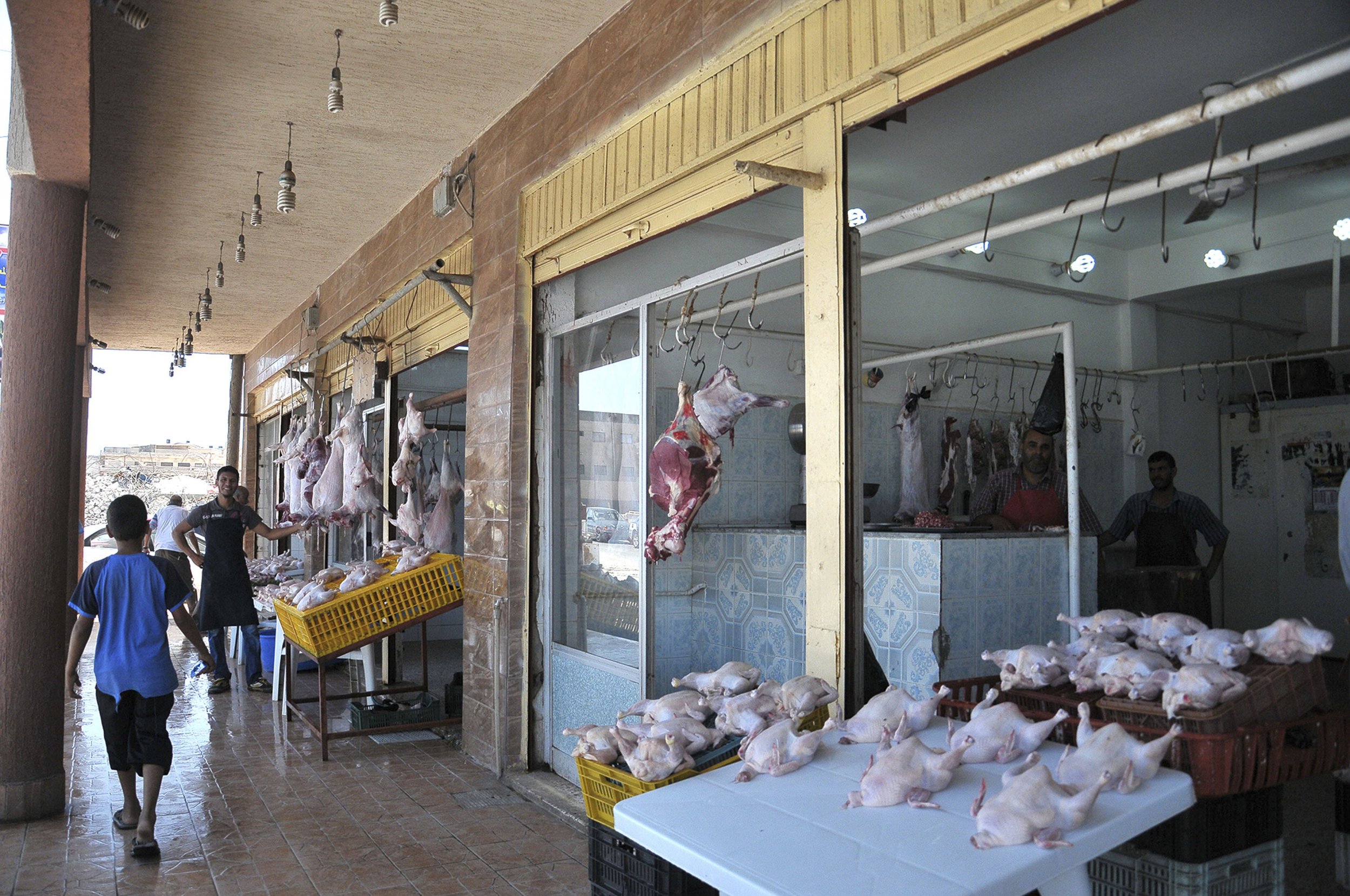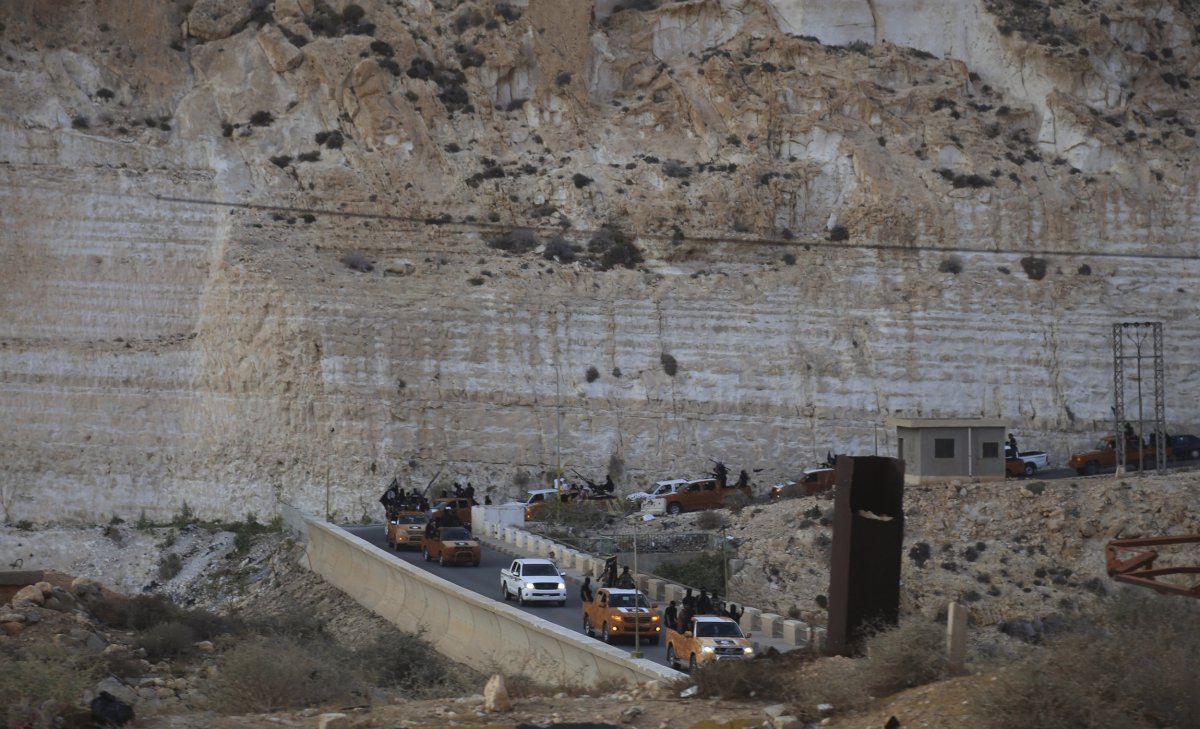
In April, fighters from the Shura Council—a coalition of Islamist militias linked to Al-Qaeda in the eastern Libyan city of Derna—and the Libyan military both claimed responsibility for the ousting of the Islamic State militant group (ISIS) from their last bastions, "district 400" and the al-Fatayeh mountains south of the city. The lives of residents who bore witness to executions, crucifixions and beheadings are now slowly returning to normal, locals say.
An anti-ISIS activist in the city, speaking on condition of anonymity for security reasons, says that residents informed of the ousting of the radical Islamist group traveled to district 400 to ensure that the news was true. "The people started moving and saw that ISIS had no more fighters there and it was completely empty," he says. "ISIS were camped in that area for nine months."
They then took their celebrations to the streets of the district and Shura Council fighters planted a Libyan flag on a mound of the al-Fatayeh mountains overlooking the coastal city. "A few minutes later, people started gathering and celebrating in the neighborhood of 400. Thousands were celebrating in the streets. Everyone."
The rival militia, who had essentially filled the lawless vacuum left by the ousting of Muammar el-Qaddafi in the city, had forced ISIS fighters out of the center of the city in June 2015. But remnants of the group's fighting force remained on the outskirts of the city. This period has allowed residents to return to some form of normality before the group was completely removed.
"The life during the last nine months, they start to become very normal," he says. "It has basically changed from the ISIS period. You have a few clashes but life is becoming normal, everything become ordinary, the schools have been opened, the hospitals opened, the banks opened."
The Islamist militias have allowed the mosques to return to normal service under the supervision of Libya's Awqaf (religious endowment) sector, belonging to the Grand Mufti of Libya Sheikh Sadik Al-Ghariani, sending Imams to lead the Friday prayers. "The Derna Shura Council have not taken any prayers, they have left it to the normal sectors to do its job," he says.
Families are beginning to also return to the city as it grows increasingly safer now ISIS is not presiding over it with its brutal brand of ultraconservative Islam. The activist's parents fled to Egypt when ISIS entered the city but have now returned home. "They were asking what is going on and they were following the Derna situation on Facebook and other things. They heard that the people are back and that everything is now normal. They are feeling very happy now and more secure."
The group had predominantly controlled the city since the radical Islamic Youth Shura Council declared an extension of ISIS's caliphate, or an "Islamic emirate," inside the city in October 2014, naming it Wilyat Barqa (Province of Barqa). This new affiliate was enabled by ISIS leader Abu Bakr al-Baghdadi, who dispatched key aide Abu Nabil al-Anbari to the city. In the following months, ISIS fighters crucified and assassinated opponents, closed the university in the city, beheaded civilians and publicly executed others in the town's main square. The activist says that ISIS killed his cousin in clashes and an ISIS sniper struck his brother in the leg as he took his son to school.
In the nine months since the group was pushed out of the city, the activist says that not one such incident has been witnessed by the city's civilians. "The Shura Council are trying to show that they are not terrorists, that they are not Al-Qaeda, and they want to have a real democracy inside the city and in Libya in general," he says. The militia coalition is willing to work with the Libyan military, which is currently conducting airstrikes against the Islamists in the city, but they have a major problem with army chief Khalifa Haftar, alleging that he committed crimes against Muslims in Libya's war with Chad in the 1980s, he says.
ISIS fighters claim that they did not leave the city because of losing battles with the Libyan military and fighters of the Shura Council, but on the orders of top ISIS officials in the central coastal city of Sirte, Qaddafi's former hometown. One of the activist's old school friends who defected to ISIS wrote on Telegram: "We did not leave Derna because we could not control it but we got orders to the leave to the main headquarters in Sirte."
He says that the Wali , or governor, of Sirte had ordered the fighters to retreat to Sirte for their own protection and, in order to reach the city some 1,500 kilometers away, they must travel under the darkness of night through the Libyan desert to avoid air strikes by the Libyan or U.S. air forces.

There are reports inside the city that the Shura Council is carrying out its own brutal punishments, not against civilians but against captured ISIS fighters. The activist says that the militia coalition executed a number of ISIS militants after an Islamic court sentenced them to death. Before the sentencing, the elders of the city summoned their families, if they were Libyan, to hear their crimes before the death penalty was carried out. "They did not do it in public," he says, comparing their executions to ISIS's. "The judge asked them to come and witness the trial, to come and hear their sons, hear what they did, if they had killed anybody. They sentenced them with death and they sent some others free."
Despite all of the changes in the city, serious day-to-day problems remain because of the wider instability. There are only three ATMs in Derna and none of them are functioning. "The banks are opened but there is no money in Libya now. There is no cash," the activist says. The Libyan army is continuing to strike the camps of the militias inside the city despite ousting ISIS.
But for all of the city's ongoing problems, the residents remain "grateful" to the militias for lifting the shadow of ISIS from the city, which may mean that further conflict lies on the horizon for this hotbed of Islamism. The militias, uniting under one umbrella coalition to battle ISIS, have "built a good trust with the residents of the city," he says. Many believe that the militias will not allow the city to go "off again to the caliphate," but will instead turn Derna into a functioning "Islamic city."
With the continuation of Libyan military strikes on the city, however, many residents will convert their gratitude into arms. "The community of Derna does not need to have another experience of war. They want to have a peaceful agreement between the Shura Council and the Libyan army. If Haftar decides to [continue to] attack the city and refuses to listen to the elders of Derna, or the resident community, I am sure that lots of ordinary people in Derna will join the Shura Council against the Libyan army."
Uncommon Knowledge
Newsweek is committed to challenging conventional wisdom and finding connections in the search for common ground.
Newsweek is committed to challenging conventional wisdom and finding connections in the search for common ground.
About the writer
Jack is International Security and Terrorism Correspondent for Newsweek.
Email: j.moore@newsweek.com
Encrypted email: jfxm@protonmail.com
Available on Whatsapp, Signal, Wickr, Telegram, Viber.
Twitter: @JFXM
Instagram: Read more
To read how Newsweek uses AI as a newsroom tool, Click here.








